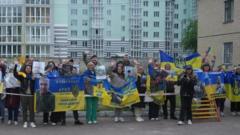Ukraine and Russia prepare for an unprecedented prisoner exchange, marking a significant step since the start of the conflict. While the deal was made during recent peace talks in Turkey, doubts persist over the process's details and legitimacy amidst broader diplomatic challenges.
Potential Historic Prisoner Swap Between Ukraine and Russia Unfolds Amid Political Tensions

Potential Historic Prisoner Swap Between Ukraine and Russia Unfolds Amid Political Tensions
Both nations agree to swap 1,000 prisoners of war in a pivotal move during stalled peace negotiations; however, significant uncertainties linger regarding the implementation and future agreements.
In a striking development in the ongoing conflict between Ukraine and Russia, both nations appear set to engage in a major prisoner swap, potentially the largest since the onset of full-scale hostilities in February 2022. Officials have announced plans to exchange 1,000 prisoners of war from each side, a decision reached amid largely unproductive peace discussions held in Istanbul last week.
President Donald Trump recently shared his optimistic views on this potential exchange via his social media platform, hinting that this development could be a key step towards a broader resolution. However, official confirmation remains elusive, with Ukrainian military sources merely indicating that arrangements for the swap are currently in motion. Unverified reports suggest the exchange could unfold over a three-day period across the Ukrainian border into Belarus.
The agreement established during the brief two-hour meeting in Turkey marked the first face-to-face interaction between Ukrainian and Russian delegations since March 2022. Despite the limited time spent together, both sides acknowledged the need for such exchanges, even if no concrete progress was made towards a ceasefire. Russian Foreign Minister Sergei Lavrov has affirmed that a second round of talks is forthcoming, during which Moscow plans to present a "memorandum" to Ukraine.
Amid ongoing tensions, Trump indicated that discussions regarding a ceasefire would commence soon following a recent phone call with Russian President Vladimir Putin. In response, Ukrainian President Volodymyr Zelensky has accused Putin of using the negotiations to stall the war while maintaining an unfavorable position. Italian Prime Minister Giorgia Meloni has offered support for a potential Vatican-led mediation, though Lavrov expressed skepticism about this option's feasibility.
Additionally, Lavrov has reiterated unsubstantiated claims questioning Zelensky's legitimacy as Ukraine’s leader, suggesting that new elections may be warranted before any peace agreement can be formalized. He emphasized that any forthcoming peace deal must be secure and equitable, with assurances that it won't pose security risks, particularly for Russia.
As Ukraine and Russia remain distant in their peace talks, the anticipated prisoner swap stands out amidst ongoing hostilities, giving rise to both hope and skepticism about its implications for the broader conflict.
President Donald Trump recently shared his optimistic views on this potential exchange via his social media platform, hinting that this development could be a key step towards a broader resolution. However, official confirmation remains elusive, with Ukrainian military sources merely indicating that arrangements for the swap are currently in motion. Unverified reports suggest the exchange could unfold over a three-day period across the Ukrainian border into Belarus.
The agreement established during the brief two-hour meeting in Turkey marked the first face-to-face interaction between Ukrainian and Russian delegations since March 2022. Despite the limited time spent together, both sides acknowledged the need for such exchanges, even if no concrete progress was made towards a ceasefire. Russian Foreign Minister Sergei Lavrov has affirmed that a second round of talks is forthcoming, during which Moscow plans to present a "memorandum" to Ukraine.
Amid ongoing tensions, Trump indicated that discussions regarding a ceasefire would commence soon following a recent phone call with Russian President Vladimir Putin. In response, Ukrainian President Volodymyr Zelensky has accused Putin of using the negotiations to stall the war while maintaining an unfavorable position. Italian Prime Minister Giorgia Meloni has offered support for a potential Vatican-led mediation, though Lavrov expressed skepticism about this option's feasibility.
Additionally, Lavrov has reiterated unsubstantiated claims questioning Zelensky's legitimacy as Ukraine’s leader, suggesting that new elections may be warranted before any peace agreement can be formalized. He emphasized that any forthcoming peace deal must be secure and equitable, with assurances that it won't pose security risks, particularly for Russia.
As Ukraine and Russia remain distant in their peace talks, the anticipated prisoner swap stands out amidst ongoing hostilities, giving rise to both hope and skepticism about its implications for the broader conflict.



















